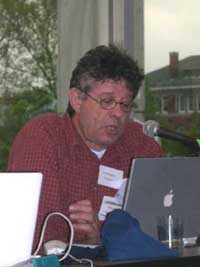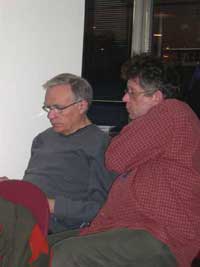TRANSITOIRE OBSERVABLE
Patrick-Henri Burgaud
Alexandre Gherban, a Romanian living in Paris, spoke to Tibor Papp, an Hungarian living in Paris, and Philippe Bootz, a Frenchman not living in Paris, about the necessity to highlight what is happening in programming literature / arts. A text has been written in 2003 February, called "Transitoire Observable" and sent in March to peers poets and artists.
The name "Transitoire Observable" is from a subchapter of Philippe Bootz PHD thesis. The Transitoire Observable is a transient hypermedia event that the reader reads on screen and created by the computer while executing. It is what is watched (observed) before applying cognitive attention. The cognition will transform the perceived element into "text-of-visualisation". It means that a "Transitoire Observable" does not belong yet to the text. Alexandre Gherban found the concept useful because it is clear that the text, or any other semiotic event on screen, is relative, transient and created by a physical process. It is not a permanent and timeless object, as, for instance, a printed text. The term gives its place to both program and physical processes acting in textual construction. We insist on the link existing between the object, which is our senses perceive, and the underlying level, which is the code at work. He refers as well to the autonomy of processes which is more of a global description than a textual concept, because it is operating in other digital mediums. Because Alexandre Gherban was a composer and a painter before he began to get involved in e-literature, he found e-lit was a part of digital arts. It is why, after discussion, we decided to open the group to both formal authors and digital artists.
Today, e-poetry in France is globally divided into three main streams: video poetry, web projects, and programming literature. The last one is growing intensively. The creators working in it are all quite familiar with the properties of the communication system, which Philippe Bootz called "procedural system". Discussions between the three currents became quite grimey. Authors creating video poetry, which I will call, screen literature, are not able to understand what the other two currents are doing. They think quite traditionally in terms of visual, textual (and other) shapes. The other ones (web based and code based) say that text is not an absolute concept but is linked to the communication system.
Transitoire Observable members are convinced that nothing radically new can come from the screen based poetry if programming is not considered as a main component inside the totality of this particular communication system. This particular system is called the "procedural system".
Phil's PHD thesis worked as a catalyst. Authors recognized their own theoretical positions in it, and among all, that the differences between the systems they are using and other textual communication systems was clearly described in Phil's thesis.
Each member has his own artistic past. All together, we present the many facets of digital art. Also, each member works within his own meanings and conceptions. Diversity is a condition for a dynamic movement. Theoretical and practical works are included in the recently upset site:
Of course, this list is not compulsory to French speakers. New artists are welcome. Transitoire Observable primarily wants to be a sharing space for research and analysis specifically adapted to digital art.
The group members are now: Wilton Azevedo (Brazil), Jean-Pierre Balpe (France), Ambroise Barras (Swiss), Louis Bec (France), Michel Bret (France), Philippe Bootz (France), Patrick-Henri Burgaud (the Netherlands), Philippe Castellin (France), Alexandre Gherban (Romania/France), Xavier Leton (Belgium), Tibor Papp (Hungary/France), Antoine Schmitt (France), and Reiner Strasser (Germany).
Written and read by Patrick-Henri Burgaud during the last e-poetry festival, june 2003, Morgantown (USA).

